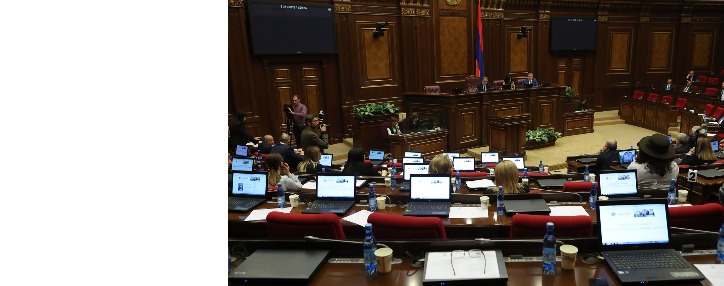Parliament approves government-designed amendments to tax code
25.06.2019,
13:54
By a vote of 73 to 32 Armenian parliament approved a package of government-designed amendments to the Tax Code in the second and final reading.

YEREVAN, June 25, /ARKA/. By a vote of 73 to 32 Armenian parliament approved a package of government-designed amendments to the Tax Code in the second and final reading.
The government says this package of laws pursues three main objectives: to help boost export-oriented branches of economy, which it says is of key importance in terms of securing long-term economic growth. The second objective is to improve the environment for micro and small businesses, which it says is important in resolving social problems and reducing the unemployment. And the third objective is to solve pressing problems which were identified over the past 12 months in various sectors of economy.
The government says the profitability rate in the export-oriented sectors is 40-50% lower than in those focused on domestic consumption. As a direct consequence of this, investments go to more profitable sectors with export-oriented sectors receiving 4-4.5 times less investment.
Studies have shown that in comparison with similar countries, the burden of direct taxes in Armenia is greater. The proposed changes call for a 2 percentage points decrease in income tax and introduction of a flat income tax scale, starting at 23%, which in three years is to fall to 20%.
These changes imply also a reduction in tax revenues, particularly, in income taxes, estimated at 30 billion drams. Payroll tax losses are estimated at more than 11 billion drams. These losses are to be compensated by indirect taxes.
The government does not offer a VAT increase, saying in essence, it is a regressive tax and any percentage increase is aggravating poverty in the country. Instead it sets fixed annual rate of excise tax growth at 3% from the previously proposed 4%.
The changes suggest also a waiver of the ad valorem excise rate, since the existing system of excise taxation means not only unequal distribution of the tax burden between the importer and the local producer, but also between goods of different price categories. At the moment, the tax is calculated based on the value of the goods.
The next group of changes is of a structural nature. It introduces a three-tier taxation system instead of a five-tier one.
According to the current legislation, dividends of residents are not taxed, while non-residents pay 10% tax. The package proposes to halve the size of the tax. The same is to apply to individuals. According to the changes, both citizens of Armenia and foreigners will pay 5% tax on dividends.
The proposed changes also affect the gambling industry, where the current tax is proposed to increase by 20%. From 2020 or 2021, depending on the results, the sector may be switched to payment of profit tax. -0-
The government says this package of laws pursues three main objectives: to help boost export-oriented branches of economy, which it says is of key importance in terms of securing long-term economic growth. The second objective is to improve the environment for micro and small businesses, which it says is important in resolving social problems and reducing the unemployment. And the third objective is to solve pressing problems which were identified over the past 12 months in various sectors of economy.
The government says the profitability rate in the export-oriented sectors is 40-50% lower than in those focused on domestic consumption. As a direct consequence of this, investments go to more profitable sectors with export-oriented sectors receiving 4-4.5 times less investment.
Studies have shown that in comparison with similar countries, the burden of direct taxes in Armenia is greater. The proposed changes call for a 2 percentage points decrease in income tax and introduction of a flat income tax scale, starting at 23%, which in three years is to fall to 20%.
These changes imply also a reduction in tax revenues, particularly, in income taxes, estimated at 30 billion drams. Payroll tax losses are estimated at more than 11 billion drams. These losses are to be compensated by indirect taxes.
The government does not offer a VAT increase, saying in essence, it is a regressive tax and any percentage increase is aggravating poverty in the country. Instead it sets fixed annual rate of excise tax growth at 3% from the previously proposed 4%.
The changes suggest also a waiver of the ad valorem excise rate, since the existing system of excise taxation means not only unequal distribution of the tax burden between the importer and the local producer, but also between goods of different price categories. At the moment, the tax is calculated based on the value of the goods.
The next group of changes is of a structural nature. It introduces a three-tier taxation system instead of a five-tier one.
According to the current legislation, dividends of residents are not taxed, while non-residents pay 10% tax. The package proposes to halve the size of the tax. The same is to apply to individuals. According to the changes, both citizens of Armenia and foreigners will pay 5% tax on dividends.
The proposed changes also affect the gambling industry, where the current tax is proposed to increase by 20%. From 2020 or 2021, depending on the results, the sector may be switched to payment of profit tax. -0-



